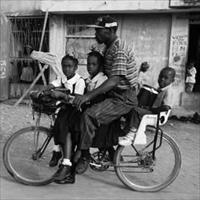ZIMBABWE: Two wheels go where four cannot
The road is uphill for most of the 15km, but if Masikosana Ngulube wants to get to school each morning in Bulawayo, Zimbabwe's second city, she has no other option but to get on her bike.
A bus ride is out of the question. What was once cheap and unremarkable is now a luxury for families on ever-shrinking budgets, instead, mass transportation increasingly means two wheels and pedal power.
"Things have changed so much - I never thought I would be forced to ride to school," said Masikosana, 14, attending her first year at Evelyn Girls' High School on the outskirts of the city in the southern province of Matabeleland North.
At dawn each morning she teams up with three boys from her neighbourhood in a mini cycling club. "The boys are a great help when one of my wheels punctures or the chain comes unstuck," said Masikosana. She keeps a tube of gum and patches among the books in her satchel. Her companions leave Masikosana at the gates of her school before heading up the road to Milton Boys' High.
'
"Cycling keeps her fit," quipped Claire Ngulube, Masikosana's mother, before adding: "It's the only way she can get to school with these frequent increases in fees and unpredictable hikes in bus fares."
Ngulube, who runs a dressmaking shop in the city, said she was lucky that her other two children were still in primary school and could walk just a short distance to get to class.
Masikosana is less than keen on having to make the daily 30-km round trip between school and home. "The bike gives me problems because of its condition. I often get to school tired and am unable to concentrate," she told IRIN. Her return journey is easier, as it is mostly downhill. "I take my time because I am not under pressure, unlike in the morning when I have to be on time for lessons."
Ngulube said sending Masikosana to boarding school was not an alternative to her cycling marathon because of the food shortages pupils often suffer. Zimbabwean boarding schools are also notorious for demanding unbudgeted mid-term "top up" fees to restock empty pantries as a result of galloping inflation, which in December 2007 officially hit 66,212 percent.
The continued depreciation of the Zimbabwean dollar against major currencies on the parallel market has also driven up fuel prices. A litre of petrol costs Zim$12 million (US$3 on the parallel market), up from Zim$6 million (US$1.60) late last year. Commuters are now forced to fork out Zim$3 million (just under a dollar) for an average trip - three times more than they paid just before Christmas.
Minibus-taxi operator Sidney Gurura denied that the vehicle owners were exploiting the situation, and said they themselves were victims of the fuel price. "If we don't raise fares we will go bust and stop operating."
Informal fuel traders who import from Botswana have filled the supply gap left by the state-run National Oil Company of Zimbabwe (NOCZIM), which has failed to import adequate supplies due to a long-standing foreign currency crunch.
Second-hand goods trader Rasheed Mohammed is not complaining. Since schools opened in January he has been pestered by parents trying to get their hands on bikes for their children.
"Anything on two wheels with a frame is snapped up as soon as we receive it," Mohammed said. "New bicycles are beyond their reach and few people are letting go of bicycles they already have because they are handy during the current fuel crisis."
 Back and Next - Back and Next
Back and Next - Back and Next
 See Also - See Also
See Also - See Also